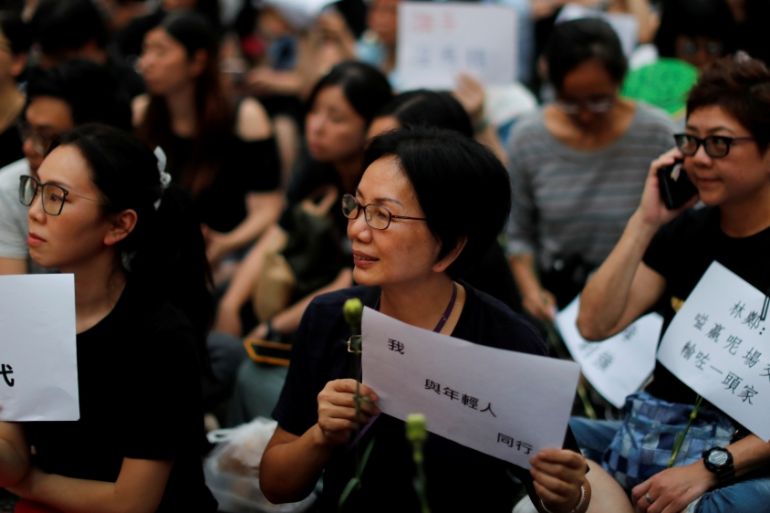Hong Kong to suspend divisive extradition bill, say reports
Leader Carrie Lam is expected to address local media after several pro-Beijing politicians called for pause on bill.

Hong Kong‘s embattled government looks set to suspend a proposed law on extradition to mainland China that sparked widespread anger and violent protests, with leader Carrie Lam planning to address the press on Saturday, local media has reported.
Support for the swift passage of the controversial extradition bill began to crumble on Friday with several pro-Beijing politicians and a senior adviser to Lam saying discussion on the bill should be shelved for the time being.
Keep reading
list of 4 itemsHong Kong’s new security law comes into force amid human rights concerns
Hong Kong passes tough new national security law
What is Article 23, Hong Kong’s new draconian national security law?
Around a million people, according to protest organisers, marched through Hong Kong last Sunday to oppose the bill. The international finance hub was further rocked by political violence on Wednesday as tens of thousands of protesters were dispersed by anti-riot police firing tear gas and rubber-coated bullets. A second reading of the bill was postponed.
Another round of protests is planned for this Sunday.
The extradition bill would allow Hong Kong’s chief executive to send suspected offenders to places with which the territory has no formal extradition agreement for trial.
It would apply to Hong Kong residents and foreign and Chinese nationals living or travelling in the city to be sent to mainland China and has many concerned it may threaten the rule of law that underpins Hong Kong’s international financial status.
As criticism mounted – and signs emerged of a growing discomfort among party leaders in Beijing – local media in Hong Kong reported on Saturday that Lam’s administration was planning to announce some sort of climbdown as it tries to find its way out of the political crisis.
Hong Kong’s iCable, the South China Morning Post (SCMP), Sing Tao newspaper, Now TV, TVB and RTHK reported that the bill would be suspended or postponed. TVB and iCable said Lam would hold a news conference on Saturday afternoon.
Lam defiant
Lam, who is appointed by a committee stacked with Beijing loyalists, has so far refused to abandon the bill despite months of criticism from business and legal bodies and in the face of the huge demonstrations.
Calls to Lam’s office have also gone unanswered outside of business hours. Lam has not appeared in public or commented since Wednesday. Hong Kong media reported Lam would meet pro-Beijing legislators to explain her pending announcement.
Backing down from efforts to drive the bill through the city’s legislature by July would have been unthinkable last week when the law’s passage seemed inevitable as Lam was adamant.
But on Friday she found herself facing growing calls from within her own political camp to reverse course and tamp down spiralling public anger.
Yet Michael Tien, a member of Hong Kong’s legislature and a deputy to China’s national parliament, said a total withdrawal of the bill was unlikely.
“The amendment is supported by the central government, so I think a withdrawal would send a political message that the central government is wrong. This would not happen under ‘one country, two systems’,” he told Reuters news agency, referring to the model under which Hong Kong enjoys semi-autonomy.
Tien, a member of the pro-Beijing camp, said he supported a suspension of the bill without a timetable.
Another march
Despite chatter that the government would hit pause on the bill, organisers of last Sunday’s protest march stood by plans for another march this Sunday. In addition to opposing the bill, they said they would also be calling for accountability of the police for the way protests have been handled.
Lam has said the extradition law is necessary to prevent criminals using Hong Kong as a place to hide and that human rights will be protected by the city’s court which will decide on case-by-case basis extraditions.
|
|
Critics, including leading lawyers and rights groups, note that China’s justice system is controlled by the Communist Party, and marked by torture and forced confessions, arbitrary detention and poor access to lawyers.
Last Sunday’s protest in the former British colony was the biggest political demonstration since its return to Chinese rule in 1997 under a “one country, two systems” deal. The agreement guarantees Hong Kong’s special autonomy, including freedom of assembly, free press and independent judiciary.
Many accuse China of extensive meddling since then, including obstruction of democratic reforms, interference with elections and of being behind the disappearance of five Hong Kong-based booksellers, starting in 2015, who specialised in works critical of Chinese leaders.
Beijing has denied that it has overreached in Hong Kong.
The extradition bill has spooked some of Hong Kong’s tycoons into starting to move their personal wealth offshore, according to financial advisers, bankers and lawyers familiar with the details.
|
|